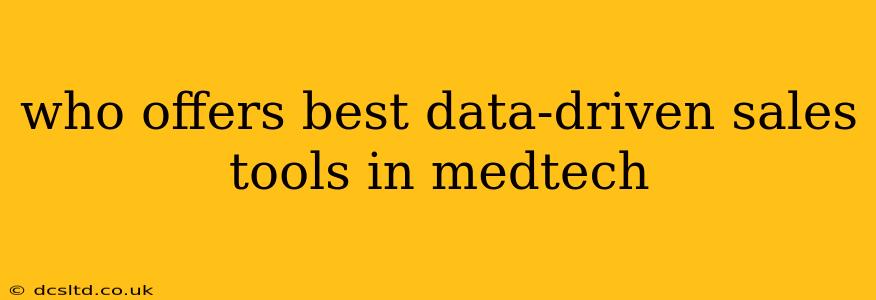The MedTech industry is increasingly reliant on data-driven insights to optimize sales performance. Finding the right sales tools can significantly impact revenue, market share, and overall success. However, the "best" tool depends heavily on your specific needs and sales processes. This article explores some leading providers and considerations when choosing the ideal solution for your MedTech company.
What Makes a Data-Driven Sales Tool Ideal for MedTech?
Before diving into specific vendors, let's define what makes a data-driven sales tool particularly effective in the MedTech sector. These tools should ideally:
- Integrate with CRM systems: Seamless integration with existing CRM platforms (like Salesforce, HubSpot, etc.) is crucial for a unified view of customer interactions and sales data.
- Provide actionable insights: Raw data is useless without interpretation. The best tools provide clear, actionable insights into sales performance, lead qualification, and customer behavior.
- Offer real-time dashboards: Access to up-to-the-minute data allows for quicker decision-making and response to market changes.
- Support complex sales cycles: MedTech sales often involve lengthy cycles with multiple stakeholders. The tool needs to manage these complexities effectively.
- Comply with industry regulations: Data privacy and security are paramount in MedTech. Tools must comply with regulations like HIPAA and GDPR.
- Facilitate personalized engagement: Understanding individual customer needs and tailoring communication accordingly is vital for success.
Leading Providers of Data-Driven Sales Tools in MedTech (and Their Strengths)
While a definitive "best" is subjective, several vendors excel in providing data-driven solutions tailored (or adaptable) to MedTech's unique requirements. Note that this list is not exhaustive and many other strong players exist.
- Salesforce: A market leader with extensive CRM capabilities. Its robust platform allows for customization and integration with other tools. Strong reporting and analytics features provide valuable insights. Its extensive ecosystem offers add-on apps for specific sales needs.
- HubSpot: Known for its inbound marketing and sales capabilities, HubSpot offers a comprehensive suite of tools, including CRM, marketing automation, and sales analytics. Its user-friendly interface makes it accessible to a wider range of users. Excellent for nurturing leads and tracking sales progress.
- Veeva CRM: Specifically designed for the life sciences industry, including MedTech, Veeva offers deep industry knowledge and regulatory compliance. Its focus on this sector ensures features are tailored to address specific challenges.
- Microsoft Dynamics 365: A powerful CRM platform with strong data analysis capabilities. Integrable with other Microsoft products, it provides a comprehensive solution for businesses using the Microsoft ecosystem.
What Features Should I Prioritize?
Choosing the right tool depends on your priorities. Consider these features:
- Lead scoring and qualification: Effectively prioritize high-potential leads.
- Sales forecasting and pipeline management: Accurate predictions for future revenue.
- Territory management: Optimize sales force deployment.
- Account-based marketing (ABM) capabilities: Focus efforts on key accounts.
- Mobile accessibility: Enable sales reps to access data and manage accounts on the go.
- Integration with other MedTech-specific tools: Seamless data flow between different applications.
How Can I Choose the Best Tool for My MedTech Company?
Selecting the ideal data-driven sales tool requires careful consideration. Consider these steps:
- Define your needs and goals: What specific challenges are you trying to solve?
- Assess your current tech stack: What systems do you already use?
- Evaluate vendor offerings: Compare features, pricing, and customer support.
- Request demos and trials: Test the tools firsthand.
- Consider implementation and training: Factor in the time and resources needed for setup.
By carefully analyzing your needs and evaluating the strengths of different vendors, you can find the data-driven sales tool that best supports your MedTech company's growth and success. Remember that the "best" tool is not a one-size-fits-all solution; it’s the one that aligns most effectively with your unique business requirements.
